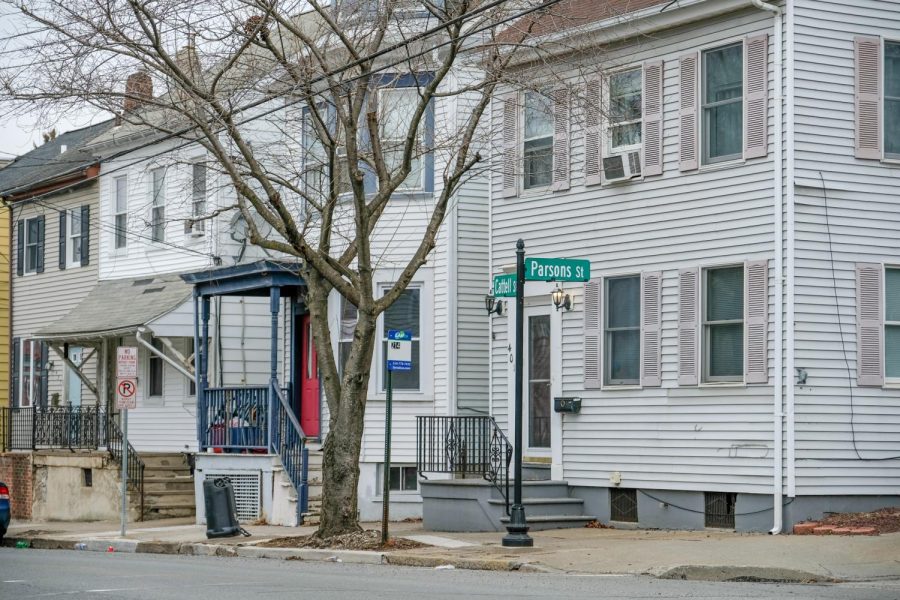The price of private off-campus housing
Many students complained about the high pricing and lack of communication as it relates to housing. (Photo by Caroline Burns ’22 for The Lafayette)
February 25, 2022
The Lehigh Valley rental market is experiencing a steep hike in prices, mirroring a nationwide median rent increase of 17.8% in the past year. While local housing officials attribute this rise to heightening costs of living, inflation and high demand, renters see the spike as a result of landlords overpricing “sub-par” properties.
Many students, who asked to remain anonymous for fear of jeopardizing their living situations, are generally paying in the range of $715 to $1,100 per month, per person, for three-person homes, under a 12-month lease.
Fifty-seven percent of apartments across the Lehigh Valley cost more than $1,000 per month, an increase from the 43% of apartments in previous years.
“I think it’s very expensive for what we get,” a senior residing on Parsons Street, whose rent falls in the higher end of this range, said. “The house is great for what we need…but it’s also just so old, very creaky…we don’t have a dishwasher, we don’t have a garbage disposal.”
The student’s frustration has been compounded by their inability to lower costs by using extra rooms on the property to accommodate other students. A City of Easton ordinance decrees that a rental unit “shall not be occupied by more than three ‘unrelated’ persons.”
However, the cost of living off-campus is not a primary concern for many students. With the college’s most economically priced on-campus options coming in at $10,720 for the 2022-23 school year, housing stands at a monthly average of $1,191 for the approximate nine months for which students are in residence on campus.
“In terms of [the] meal plan and utilities, everything I’m paying, it comes up to two-hundred dollars [less] a month,” one junior, comparing their projected off-campus expenses to their on-campus living and dining fees, said.
Some students also enjoy positive relationships with their landlords.
“She is extremely responsive, respectful and communicative,” senior Sofia Khalek ‘22 said. “Whenever something isn’t working properly or we have questions, she immediately sends someone to fix it within a day or two, and answers us within a few hours.”
However, this level of responsiveness has not been the standard for all. For Emma Van Cleef ‘23 and Emory Chiappa ‘23, two juniors who were recently approved by the college to pursue off-campus housing, the lack of communication from their potential landlord led to fears that they would not be able to complete the necessary paperwork by college deadlines.
“We would have to email him multiple times, to the point where we were thinking, ‘Does he not want us to live at this property?’ Because of how little care…he had towards communicating,” Chiappa said.
Chiappa and Van Cleef, who know the seniors currently living in their future house, said the current tenants are concerned about their living conditions and that their house has “not been kept up to date.” Some ground floor windows also cannot be locked, eliciting security concerns, especially after break-ins on neighboring blocks last spring.
This concern for the living conditions students experience in privately owned off-campus housing, as well as a lack of communication from local landlords, is shared by English Professor Kathleen Parrish.
Parrish has two sons who attended Lafayette, graduating in 2017 and 2020. Both lived on Cattell Street, and both faced health and safety hazards that went unaddressed in their respective properties.
“There was no accountability from the landlord,” Parrish said. “In the one instance there was mold, and they were getting sick but…it’s not like you could call them and they would be responding and come out and take care of the situation.”
“It was what it was…that’s a lot of the situation you know, you either take it or leave it,” Parrish continued. “There’s no one as a parent, no one to call to have that addressed. You’re really at their mercy.”
Parrish partially attributes the disinterest shown by her sons’ landlords to their knowledge that there is a high volume of students looking at the limited inventory of properties located closest to campus.
“If you want to live off-campus as a senior there’s only a limited number of landlords [who] have been renting to students for years…they kind of know that they don’t have to make any improvements,” Parrish said. “They can rent as is, and students are well aware of what those conditions are.”
These experiences led Parrish to purchase her own property on Pardee Street in 2019. She hopes to rent to students for next year and to provide the open channel of communication that her sons lacked. She is also offering the option for a ten-month lease, more closely accommodating the length of the academic year than the majority of landlords who offer students 12-month leases.
For many students, a lack of information contributed to stress in finding and residing in off-campus properties. They noted naïveté regarding the costs of utilities and a lack of information regarding college-owned off-campus options.
Many students expressed gratitude that they began contacting landlords months in advance of the release process, or for being able to view the properties of upperclassmen friends who previously resided off-campus.
“I think being in a sorority really helped because the girls that lived here before myself and my roommate were girls in the sorority,” a senior who lives on Cattell Street said.
The student said that she would have faced greater difficulty in securing a lease without the insider knowledge provided by these connections.
“I think it’s an extremely flawed system in general,” Marjorie Long ‘22 said.
Long said the “hush-hush” culture surrounding the release process occurs in randomized batches or “waves.”
She further explained that this culture is paired with limited guidance and support provided by the Office of Residence Life, particularly in terms of navigating the process after release. To her, it seems to send the message that “we’re going to make it super difficult for you to get released. There’s no rhyme or reason. And we’re not going to protect you once you’re released.”






















































































































